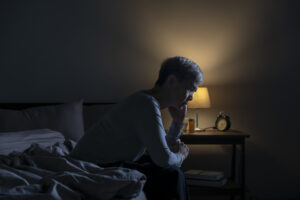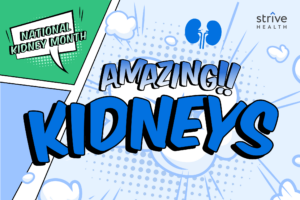Struggling to Sleep — Set the Scene
Author : Melanie Nelson, LCSWStruggling to fall asleep at night? Waking up in the middle of the night and then having trouble falling asleep again? Studies show that 50-75% of people with CKD or ESKD have some type of insomnia…so you are definitely not alone!
Small changes to your sleep habits can naturally improve the body’s ability to fall asleep consistently and to fall asleep faster. They are not an instant cure, so please try them every night for at least two to three weeks to make them a new habit and give your body time to adjust.
Dark room: Create a cave for yourself.
Light disrupts your natural sleep-wake cycle. Before the invention of electricity, the body was used to using the sun’s rising and setting as cues for falling asleep. Artificial light tricks your brain into thinking it’s time to be awake and affects the amount of melatonin your body produces, which is the hormone your body produces in response to DARKNESS that makes you feel sleepy.
- Cover all your windows with room-darkening drapes or use blinds and curtains together.
- Use curtain rods that wrap around the sides of the window or mount the curtain rod inside the frame of the window.
- For an inexpensive or temporary fix, use aluminum foil with tape, or blankets.
- Keep all lights off in your room while you sleep! If you need a small night light for safety, utilize plug-in lights that aim the light downward, away from your line of sight.
No blue light: Eliminate all light from electronics.
Blue light, the type of light found in electronics, acts as a stimulant for the body and suppresses the production of melatonin. Research also suggests there is a strong relationship between low levels of melatonin and poor sleep with obesity, diabetes and heart disease, all of which affect your kidneys!
- Turn off the TV an hour before bed (gasp!). For many people, this is REALLY hard. If you absolutely cannot fall asleep without the background noise, try turning the brightness all the way down until the screen goes off.
- Turn off your cell phone an hour before bed. There is also a setting that can change the phone’s color spectrum from its normal blue light to a more orangish-red type of light that is much less stimulating. On iPhones this is called Night Shift and can be set from sunset to sunrise, on Samsungs it’s called Blue Light Filter, and on Androids it’s called Night Light. Search your settings to turn this on and off automatically.
- Check your alarm clock to see if it uses blue or green light for its numbers and consider changing it for one with a red-colored display.
- Unplug any chargers with lights that stay on all night, or cover the light with a piece of tape.
Keep it COOL: Humans sleep better in the cold!
Your body produces more melatonin in a cool room…remember, melatonin is the hormone that helps you fall and stay asleep. And a bonus benefit is that the sound from fans and air conditioners can help drown out background noise!
- Turn on a fan or air conditioner if possible. Clean the filters and fan blades regularly to minimize dust if you have allergies or asthma, both of which can trigger snoring and sleep apnea.
- Keep your clothing and blankets light.
Keep it QUIET: Minimize distracting noise.
- Try sleeping with the TV off.
- Try a noise machine or an app on your phone that plays noise on a continuous loop. White noise, brown noise, rain sounds, thunderstorms or beach sounds are common sleep background sounds.
- If you sleep with someone who snores, ask if they would use nose strips, which can be applied at bedtime and help open the nasal passages. Snoring is more likely when people lie on their backs, so talk about using a pillow on each side to help them stay in a side sleeping position.
- Try earplugs if you are a light sleeper or sleep with someone who snores. Soft foam earplugs come in various sizes, while silicone ear plugs are spread across the opening of the ear to seal it shut.
Note: This is the first of a three-part series titled “Struggling to Sleep.” Each article addresses how people with CKD and ESKD can improve their sleep quality and habits.






